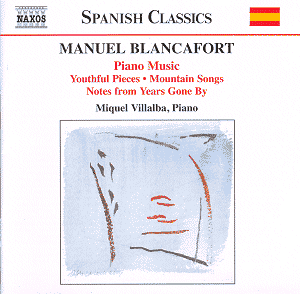Another winner from the Naxos Spanish Classics
which is threatening to rival that label's American and British
series in terms of indispensability. This is the first in a projected
sequence of piano music by the hitherto rarely encountered Catalan
composer Manuel Blancafort and, like the best of the series so
far, Rodrigo of course excepted, the music herein owes little
to the traditional Spanish axis of Albeniz, Granados etc. French
impressionism in general and Ravel, himself half-Basque, in particular
are in the mix, as is Blancafort's friend and Catalan contemporary
the great Federico Mompou. The music is quite individual though
for the age at which the composer wrote it - the latest included
here when he was just 23! Mompou is not a bad reference point
though, although this is slightly less austere or introverted,
a little warmer, more romantic but definitely not florid. It does
often share with Mompou though, a clarity, simplicity and dignified
air of controlled melancholy/nostalgia. I was also even reminded
at times, perhaps for the strong use of song/folk-based motifs,
of the piano works of Janáček,
Tveitt and Moeran, none of whom one would really associate with
Spain!
The seven Youthful Pieces form an effective
introduction to the idiom described above and, from this opening
section onwards, I don't recall a single track (and there are
37 of them!) which didn't interest me in one way or another. Many
of them did a great deal more. The nine Mountain Songs,
Blancafort's Songs Without Words, if you like, show the
composer's affinities with nature. We hear of lullabies, snowfalls
and sunsets but there is not a note too many, not a hint of bombast
or tweeness. The juxtaposition of meditative and exuberant music,
even in the same track is highly reminiscent of Mompou in his
superb Cançons y Danzas set. The title Notes
from Years Gone By should be self explanatory - according
to pianist Miquel Villalba's highly informative notes some of
these pieces "anticipate the Nocturns of 20 years later"
in their youthful maturity. Admirers of Ravel's Tombeau de
Couperin will love this suite, although some of the slower
pieces suggest Debussy more - try La lluna brilla. The
closing Tema popular, based on a traditional Catalan song,
leads us fittingly into the latest and last suite on the CD, the
12 Cançons, many of which are, unsurprisingly, given
the title, also of similar provenance. Like much of the music
recorded here, themes tend to relate to solitude, nature and also
childhood, so we hear "about" a hermitage, a shepherd boy and
twilight. Nine of the thirteen tracks are unpublished - there
are thirteen because two versions of one of the "songs" are included
- but listening quality of these short but concentrated essays
it is astonishing that they have remained that way for so long.
Naxos and Miquel Villalba should be congratulated on producing
an excellent recording of a great performance of some beautiful
music that has gone unheard outside its native region for far
too long. I'd go as far to say that this is an essential purchase
for anyone interested in twentieth century piano music. A really
wonderful disc, another top three of 2003 contender!
Neil Horner
